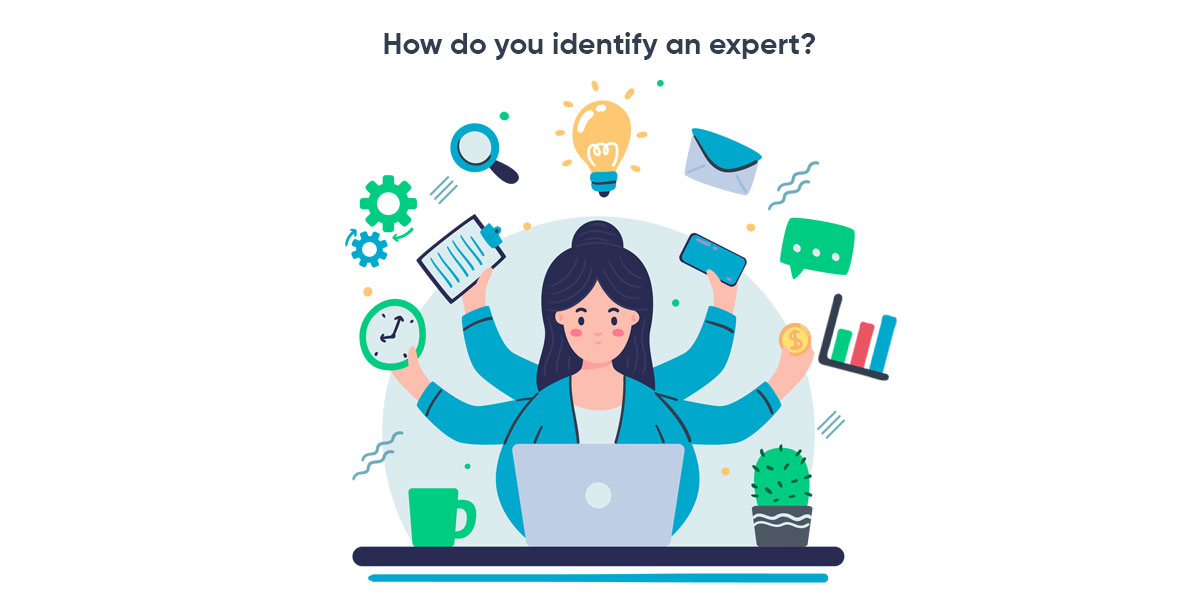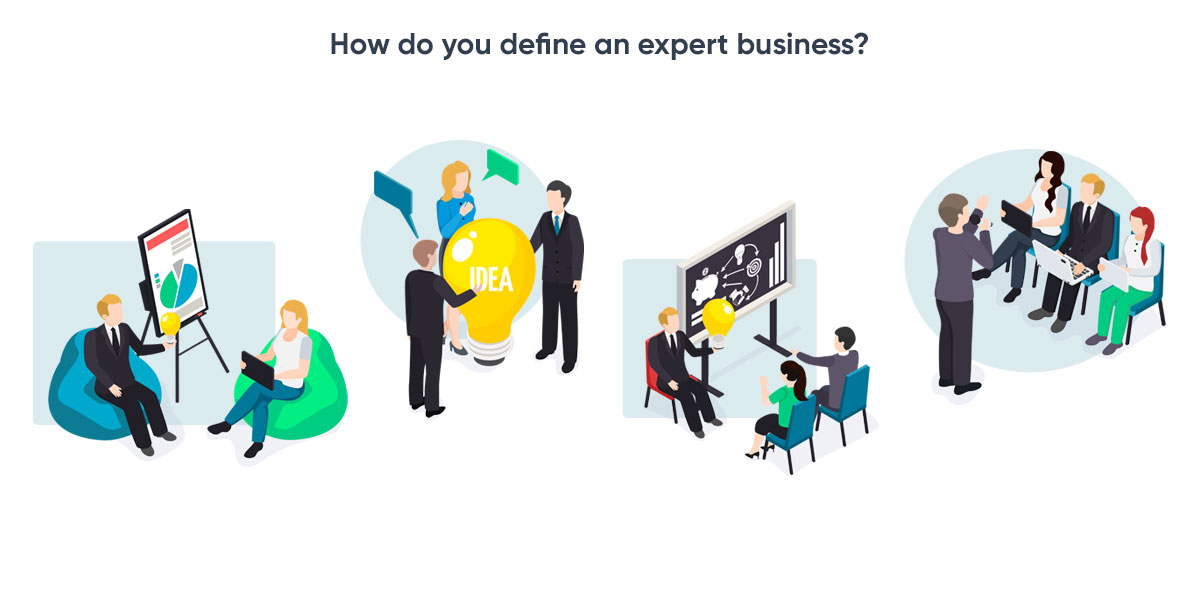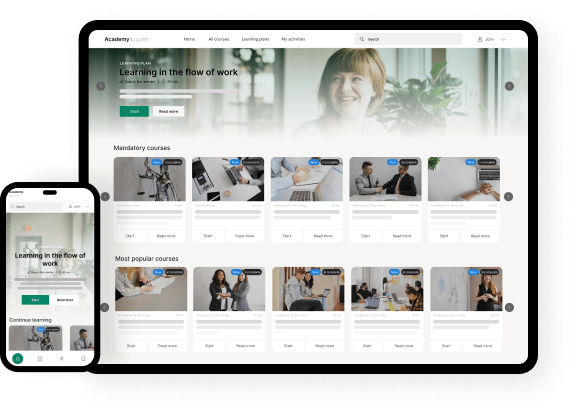Building a business around your expertise will not only help validate your intellectual property. If you’re a real connoisseur within your field and industry, it might be a very lucrative choice too.
To set you up for maximum success, in the following we’ll give you five steps to creating a successful expert business.
Before diving into these steps, we’ll dig deeper into what the terms “expert” and “expert business” mean.
What makes an expert?
An expert is one with a high level of knowledge or special skill in a particular subject or discipline (e.g., marketing or data management). Such skills or knowledge are often derived from either formal education, training, or experience.

What is an expert business?
Simply put, an expert business is a way to monetize knowledge by creating a service, product, or offering around your expertise. These kinds of businesses are a distinctive and strategic model of delivering professional knowledge to a specific audience through a value-based content fueled brand strategy.
An expert business can be built around knowledge within many different areas such as how to use specific client software or more broad topics like employee onboarding or compliance in business.
Likewise, expert businesses can take different expressions. Here are a few different forms:
- Consulting
- Coaching
- Speaking
- Training
Running an expert business isn’t just about knowledge monetization. The most successful expert businesses also focus on product development, distribution strategies, marketing, and branding.

How to start an expert business
There is certainly no right or wrong way of starting an expert business. As David Ziembicki, founder of the Expert Business Agency, says in this podcast, you can either monetize your expertise through strategic career growth in the corporate world or turn to coaching, consulting, training, or the like as a form of business.
If the latter approach is what you’re aiming at, we have gathered five steps to give you an idea of what goes into the process of developing a winning expert business.
Step 1: Identify your target audience
Defining your target audience is an important step in finding out how to serve your expertise to people. Understanding your audiences’ interests and pain points gives you a good idea of who your ideal customer is.
But how do you know which part of the vast market to target?
In order to help understand and target an audience, our advice is to create customer personas and not just stick to the common practice of segmentation.
Whereas segmentation lets businesses understand different sets or groups of customers, personas allow you to better grasp these homogenous groups and recognize key traits within them.
A customer persona is a representative sample of your audience. They’re built on thorough analysis and research of real customers, which helps create a more in-depth picture of your intended or imagined customer.
The data you collect in this process goes beyond demographic data such as race, education, or gender. It should always also include more psychological information that can be found in e.g., your customers’ buying behavior.
Step 2: Set SMART objectives
Setting clear objectives enables you to better communicate your value to customers.
As a thought leader, your clients will take your words seriously. Therefore, it’s vital that your goals and actions resonate with your target audience.
To make your objectives communicable and relevant, make them specific, measurable, achievable, relevant, and time-bound – or simply just: SMART.
Specific
An example of a business objective could sound like this:
We want to train people how to utilize a cutting-edge technology that will help them manage company data.
But if you would want to take it up a notch and make it more specific, you can instead say:
We want to train data analysts on how to use Azure Purview, a unified data governance solution that helps manage and govern on-premises data.
The point is that specific objectives let you emphasize your customers and promote your value from the get-go. They also leave no mystery of what your customers receive from you.
Measurable
Measurable objectives can be tracked using metrics like time, percentage, or ratio.
For your expert business, a measurable objective could be something like this:
To gain 500 training course completions with an 85 % retention rate or higher.
Setting measures is essential to track your progress. Measures give you direction, motivation, and a good grounding for making informed decisions for the future.
Achievable
Achievable objectives are sensible and realistic. They are goals you believe you can actually achieve within your current skill set, network, or resources.
Relevant
To determine your objectives’ relevance, ask whether they:
- Complement your company’s overarching mission
- Fit your current situation
- Are worth your time and effort
Keep in mind that any short or long-term goal that matters to your company and customers is considered relevant.
Time-bound
Without a timeline to walk you through your deliverables, your objectives might look like a mere bucket list. But by setting your standards and following a timeline, your goals are more likely to come to fruition.
That is because working within a particular timeframe lets you focus on the results. It allows you to set your priorities in place by breaking them into bite-sized tasks.
Step 3: Productize your expertise
To productize your expertise means transforming your knowledge or skills into a standard or packaged product that you, for example, can sell through an online academy like ours.
An online academy lets you package your expertise in large or small bites (e.g., eBooks or courses) for your customers to consume anytime and anywhere.
Productized knowledge allows you to scale your business and serve more customers without having to hire more employees to help deliver your expertise. Furthermore, you achieve a repeatable process and can create a duplicable outcome.
Step 4: Keep content updated
To keep your customers satisfied is not just about keeping creating content. What’s more important is to keep your content up to date – especially if your expertise lies within a field that keeps evolving.
When you have productized your knowledge with an online academy doing just that is no problem.
Correcting your digital materials is a thousand times easier than having to refresh analog materials. Going digital secures a streamlined process that frees you from making something repeatedly.
Step 5: Market and sell, sell, sell
When you take the tangible product approach and pair it with the expert content approach, this step is easier to overcome.
Productized knowledge is way easier to talk about and pitch to potential leads than non-productized knowledge. Having a repeatable product enables you to create foundational marketing activities.
Furthermore, it’s a simpler process to generate awareness and trust when you can provide a static solution that doesn’t fluctuate in quality.
Keep in mind
Notice how the above steps don’t necessarily come in the order they are presented. For some, it makes better sense to start by setting up their SMART objectives and then moving on. It all depends on where in the process of building your expertise business you are.
Nevertheless, at Cursum we reckon that productizing your expertise is one of the most important steps in creating a winning expert business.
Transforming your knowledge to a tangible product lets you:
- Scale your business much easier.
- Gain greater control of your business.
- Package your service(s) into an all-in-one solution with pre-defined descriptions and easy-to-follow instructions.
- Optimize your branding and marketing initiatives by exploiting different pricing strategies.
- Automate your processes and develop a more consistent output.
All this helps future-proof your business, which is especially important if you’re finding yourself in a highly competitive industry.
Productizing your expertise with an online academy does not exclude you from running an offline service business, though. An online academy can certainly work well as a complement to any in-person activities you offer. Most times it will actually help you cater to a bigger and more diverse audience.
Find more information about our online academy here or book a free demo of our platform today at the button below.


